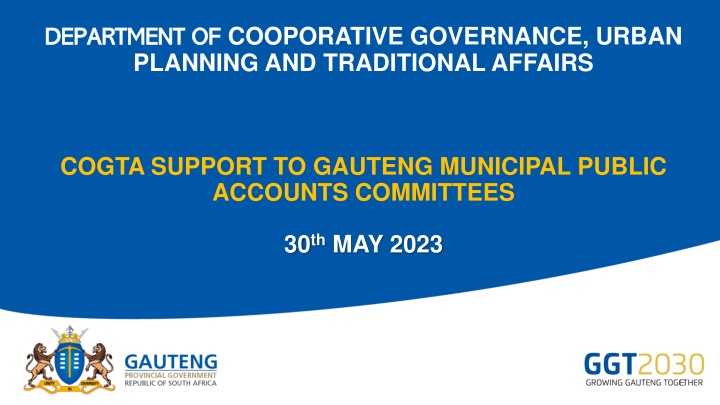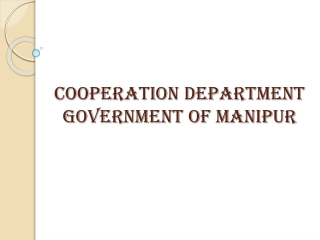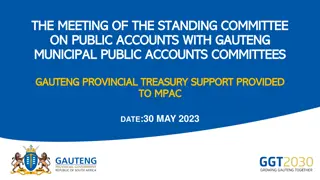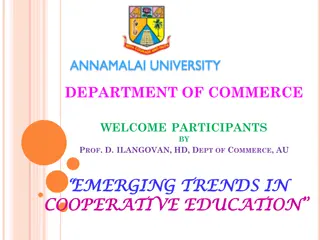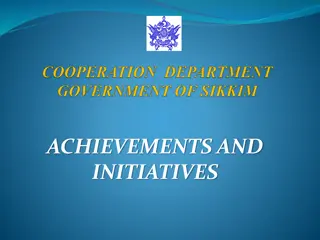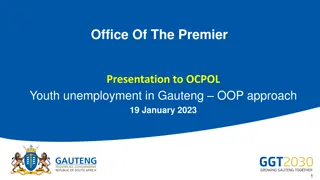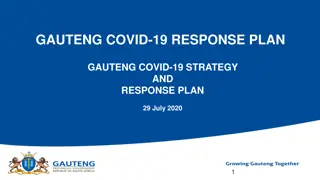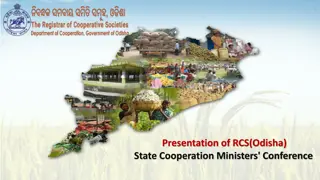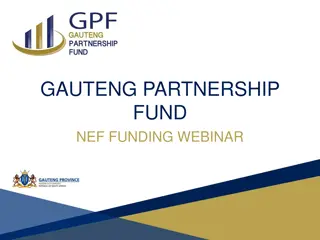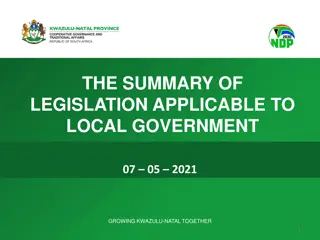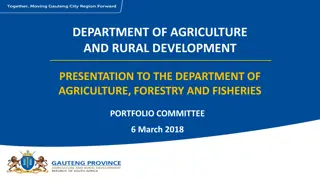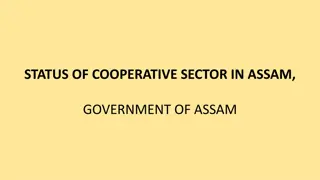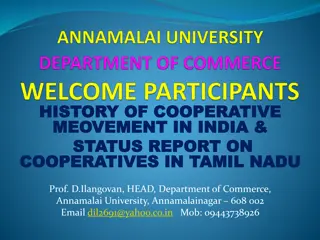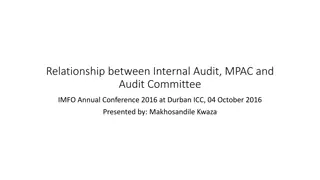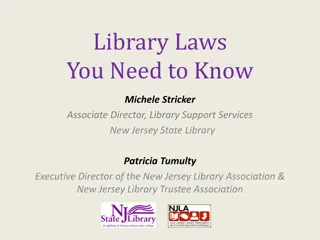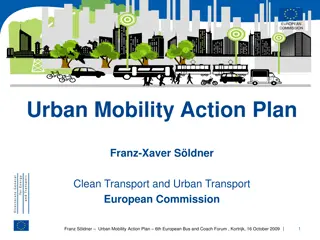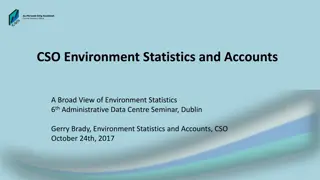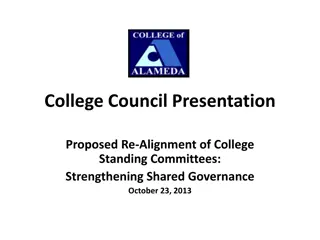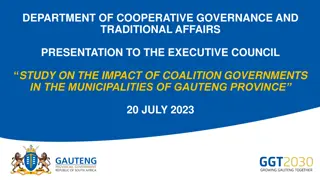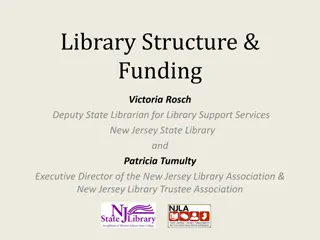Cooperative Governance and Urban Planning in Gauteng: Support to Municipal Public Accounts Committees
The Department of Cooperative Governance, Urban Planning, and Traditional Affairs (COGTA) in Gauteng provides support to Municipal Public Accounts Committees (MPACs) for clean audits, anti-corruption measures, and more. Upholding the RSA Constitution, the department aims to drive effective cooperative governance for sustainable municipalities and inclusive communities in the Gauteng City Region.
Download Presentation

Please find below an Image/Link to download the presentation.
The content on the website is provided AS IS for your information and personal use only. It may not be sold, licensed, or shared on other websites without obtaining consent from the author.If you encounter any issues during the download, it is possible that the publisher has removed the file from their server.
You are allowed to download the files provided on this website for personal or commercial use, subject to the condition that they are used lawfully. All files are the property of their respective owners.
The content on the website is provided AS IS for your information and personal use only. It may not be sold, licensed, or shared on other websites without obtaining consent from the author.
E N D
Presentation Transcript
DEPARTMENT OF DEPARTMENT OF COOPORATIVE GOVERNANCE, URBAN PLANNING AND TRADITIONAL AFFAIRS COGTA SUPPORT TO GAUTENG MUNICIPAL PUBLIC ACCOUNTS COMMITTEES 30thMAY 2023
TABLE OF CONTENTS Implementation of the District Development Model Legislative Background and Role of the Municipal Public Accounts Committees (MPACs) Overview of Functionality of MPACs Support Plans and Programmes to MPACs on UIF&W Support to MPACs on Clean Audits Support to MPACs on Anti-Corruption Measures Challenges of MPACs Recommendations
RSA Constitution (1996) & White Paper on Developmental Local Government (1998) Constitution (1996) (S152) The objects of local government are: a) to provide democratic and accountable government for local communities; b) to ensure the provision of services to communities in a sustainable manner; c) to promote social and economic development; d) to promote a safe and healthy environment; and e) to encourage the involvement of communities and community organisations in the matters of local government. Outcomes Provision of household infrastructure & services Creation of livable, integrated cities, towns and rural areas LED Empowered communities
DEPARTMENTAL MANDATE The Department of CoGTA derives its mandate from the Constitution of the Republic of South Africa, 1996: Section 139: provides that the Provincial Executive may intervene if a municipality fails to fulfil an executive obligation. Section 152: provides for democratic and accountable government for local communities Section 154: provides for support and strengthening the capacity of municipalities to manage their own affairs, exercise their powers, and perform their functions. Chapter 12: provides for the recognition of the institution of traditional leadership. The Department s mandate is further articulated in other pieces of secondary legislation and policy documents, which include the following: White Paper on Local Government, 1998 Traditional Leadership and Governance Framework Act No. 41 of 2003 Local Municipal Finance Management Act, 2003 Intergovernment al Relations Framework Act 13 of 2005 Municipal Systems Act 32 of 2000 Government Structures Act 117 of 1998 Municipal Property Rates Act (No. 6 of 2004) Disaster Municipal Demarcation Act (No. 27 of 1998) Management Act (No. 57 of 2002)
COGTA VISION, MISSION AND OUTCOMES IMPACT 4 OUTCOMES MISSION VISION 0 To drive an effective system of cooperative governance to build sustainable municipalities, inclusive communities and the institution of Traditional Leadership in the Gauteng City Region. Improved municipal performance in line with B2B pillars Sustainable , Smart, Inclusive Cities and Communitie s in the Gauteng City Region. Resilient and Sustainable Communities Through Service Delivery Safe, spatially integrated cities and communities with inclusive growth Effective Systems of Cooperative Governance Strengthened institution of Traditional Leadership
IMPLEMENTATION OF THE DISTRICT DEVELOPMENT MODEL
RDP & White Paper: LG provision of services as economic driver. Constitution: LG center of governance & promotes Integrated Development Planning Section 152 Provide democratic & accountable government for local communities 153 Developmental duties of municipalities 154 The national government and provincial governments, by legislative and other measures, must support and strengthen the capacity of municipalities to manage their own affairs, to exercise their powers and to perform their functions. Section Section The 1st priority is meeting basic needs of people, jobs, land, housing, water, electricity, telecoms, transport, clean & healthy environment, nutrition, healthcare and social welfare RDP Administer, budget & plan: priority to basic needs Promote social & economic development of community Participate in national and provincial development programmes Services provision in sustainable manner Promote social & economic development Promote safe & healthy environment Encourage involvement of communities 7
WHAT PROBLEMS ARE DDM TRYING TO SOLVE? No real long-term approach Need for shift from alignment Weak sector dept involvement in IDPs Planning & budgeting Poor integration Poor inter-sphere collaboration Deficient strategic focus of plans IGR mechanisms not optimally utilised Lack of coherence No real joint planning Poor service delivery & Development impact Implementation across govt GDS & SDF not having broad buy-in Limited localisation of NDP & MTSF No coherent performance mgt Fragmented plans across govt
OBJECTIVES OF THE DISTRICT DEVELOPMENT MODEL A Solve horizontal & vertical Silos Narrow distance between people and government Deliver Integrated Services and M&E Inclusive and gender responsive budgets and programmes based on people and community needs Youth empowerment Maximising impact Facilitate for Local Economic Development Sustainable development, accelerate initiates to promote poverty eradication, employment & equality Inculcate Long Range Planning
CRITICAL FEATURES OF THE DISTRICT DEVELOPMENT MODEL Improve Cooperative Governance 52 One Plans and intergovernmental coherence aimed at building a capable, ethical and developmental state LT strategic framework from joint planning, budgeting & implementation over multiple cycles (single line of sight) Harness a Strategic Country approach Spatialisation & Reprioritisation shared understanding, vision & maximum socio-economic development impact focus in 52 of programmes & budgets of 3 spheres over ST, MT & LT in terms of One Plan outcomes, targets & commitments spaces Practical model & methodology Political & technical support of govt working in unison in district & metro spaces as convergence points & impact areas within current/enhanced regulatory President & political champions/ DDM PMO & District Hubs/ Improved LG capacity & service delivery interventions frameworks
DISTRICT DEVELOPMENT MODEL AS A GAME CHANGER District geographic spaces point of achieving country s developmental outcomes and integration; District state of development provides baseline and unit of analysis for informing all spheres of government plans and budgets; Strategic response to socio-economic impact of Covid-19; Stimulate new thinking, new socio-economic paradigms, new and bold solutions and alternative; Fundamentally change conditions People Economy Poverty, unemployment and inequality Space DISTRICT DEVELOPMENT MODEL Introduces new IGR planning, budgeting and implementation paradigm and discipline (spatial targeting and budgeting towards common long term outcomes) Develop resilience and prosperity of the Country.
TO ACHIEVE THESE NEEDS: Good Governance RDP + Transformative & Effective Service Delivery & and Vibrant Communities Resilient, Cohesive, Sustainable, Connected = Sound Financial Management + Ethical, Effective Leadership & Administration 7 months since the DDM launch. We intended to return earlier, but were interrupted by COVID-19.
FOCAL AREAS OF THE DDM ONE PLANS People development: Poverty levels, unemployment, child and women headed households, youth, culture, health Economic positioning: Economic performance, diversification, beneficiation, comparative advantages, green economy Integrated service provisioning: Integrated and sustainable service delivery, 4IR, innovation Infrastructure engineering: Integrated infrastructure delivery, human settlements, water, sanitation, electricity, waste management Governance: Accountability, audit performance, financial performance, vacancies, ward committees, stability of the administration Spatial Restructuring and Environmental Sustainability: Spatial integration, human settlements, climate change
The implications of the DDM on municipal financial management, governance, and accountability
REPRIORITISATION: CORE TO EFFECTIVE DDM IMPLEMENTATION KEY ACHIEVEMENTS ON FOCUS AREAS- S139(1)(b) Within the implementation process, the DDM is implemented through two interrelated processes to be followed by the whole of government. These processes entail spatialisation and reprioritisation: Spatialisation the process of translating development priorities and objectives into spatial locations (district and metropolitan areas) and according to local spatial and place-making logic of these areas manifesting in physical and integrated impacts on people s lives and the places they live in. Reprioritisation the process of reviewing and changing existing plans and budgets and undertaking future planning and budgeting to realise the desired physical and integrated impacts over the long-term. The DDM implementation therefore refers to the spatial framing of development priorities and objectives and the review and reprioritisation of plans, budgets and programmes by each sphere, sector department and state entity that takes place within the prescripts of the Government Planning, Budgeting and reporting cycle. DPME and NT play a crucial role in terms of mandated functions to ensure coherent fit and configuration of the MTSF and Budget Guidelines to enable DDM implementation. 15
IMPACT OF ECONOMIC RECOVERY PLANS AS PART OF DDM ONE Plans KEY ACHIEVEMENTS ON FOCUS AREAS- S139(1)(b) Additionally, DCOG issued Circular No 1 of 2020 which directed districts and metropolitan municipalities to develop and implement Economic Recovery Plans as a programme of action to mitigate the effects of COVID-19 in the economy. Subsequently, district and metropolitan municipalities were requested to ensure that the Economic Recovery Plans are incorporated into the DDM One Plans. Thus the development and incorporation of the Recovery Plans into the One Plans further shapes how financial management is to be undertaken by municipalities To this effect, municipalities are expected to reprioritize and align their budgets as part of giving effect to Economic Recovery Plans 16
IMPACT OF STRATEGIC LINKAGES TO ONE PLAN CONTENT AND IDPs KEY ACHIEVEMENTS ON FOCUS AREAS- S139(1)(b) From a content perspective, Governance and Financial Management is one of the DDM One Plan Pillars. It requires that the process by which leadership and management is exercised, in particular, that planning, budgeting, procurement, delivery, financial and performance management takes place in an effective, efficient, accountable and transparent manner. Joint planning and implementation as one of the key founding principles of the DDM effective joint planning facilitates integrated budgeting across the three spheres of government in order to realise maximum impact within a specific metro or district space The DDM One Plans, as long-term strategic plans, are given effect through IDPs which are medium term strategic plans developed by each municipality. To ensure the effective implementation of each of the 5 One Plans in Gauteng, each municipal IDP along with accompanying budget, must therefore be aligned to the One Plan in its region/metro space. This is particularly key for DDM One Plan projects that are driven by municipalities but also in enabling the efficient implementation of DDM projects being implemented by the other two spheres and state entities 17
SUMMARY KEY ACHIEVEMENTS ON FOCUS AREAS- S139(1)(b) Municipal financial management is impacted by DDM as it now has to be undertaken as part of the umbrella of joint planning and guided by key strategic projects and programmes included in the relevant DDM One Plan Moreover, municipalities as key partners in the DDM implementation process, ought to undergo a process of reprioritizing their budgets to align with the relevant DDM One Plans projects in their areas in consultation with provincial treasuries and key stakeholders Annual municipal budgets must give effect to the IDPs and projects and programmes driven by the respective municipality as captured in the appropriate district/metro One Plan Budgetary processes are to be undertaken in a consultative fashion guided by the DDM key principle of joint planning and integrated budgeting 18
BACKGROUND: LEGISLATIVE FRAMEWORK According to the MFMA Section 32 (4) The accounting officer must promptly inform the mayor, the MEC for local government in the province and the Auditor-General, in writing, of (a) any unauthorised, irregular or fruitless and wasteful expenditure incurred by the municipality; (b) whether any person is responsible or under investigation for such unauthorised, irregular or fruitless and wasteful expenditure; and (c) the steps that have been taken (i) to recover or rectify such expenditure; and (ii) to prevent a recurrence of such expenditure.
LEGISLATIVE BACKGROUND AND ROLE The Municipal Public Accounts Committees (MPACs) are established in terms of section 79(A) of the Local Government: Municipal Structures Amendment Act, Act No. 3 of 2021 which states: (1) A municipal council must establish a committee called the municipal public accounts committee. The MPAC serve as oversight committee over the executive obligation of the Municipal Council. Their main function is to assist the Municipal Council to hold the municipal executive and administration accountable for the implementation of laws, regulations, policies and the budget. Section 129 of the MFMA requires a Municipal Council to consider the annual report of its municipality and municipal entities and adopt an oversight report containing the council s comments on the annual report. MPACs are required each year to produce such an oversight report on the municipality s annual report. Furthermore, the committee is required to investigate and report to a Municipal Council on any other matter as mandated by a Municipal Council including investigations on unauthorised, irregular, fruitless or wasteful expenditure i.o.f Section 32 of the Municipal Finance Management Act (MFMA), Act No. 56 of 2003. 21
BACKGROUND: LEGISLATIVE FRAMEWORK Section 131 of the MFMA states that: A municipality must address any issues raised by the Auditor- General in an audit report. The mayor of a municipality must ensure compliance by the municipality, with this subsection; The MEC for local government in the province must-(a) assess all annual financial Statements of municipalities in the province and the audit reports on such statements and any responses of municipalities to such audit reports, and Determine addressed any issues raised by the Auditor-General in audit reports; and Report to the provincial legislature any omission by a municipality to adequately address those issues within 60 days . whether municipalities have adequately
MPAC PROCEDURAL FUNCTIONALITY & 2021/22 OVERSIGHT REPORTS Rand West City LM and Merafong City LM s Annual Reports have not been approved as the MPAC Committees have not been established. Sedibeng DM, Emfuleni LM and CoT are still busy with the OR hearings.
SUPPORT TO PREVENT THE GROWTH OF UIF&W EXPENDITURES
UIF&W EXPENDITURE SUPPORT The project is designed to assist municipalities to put controls in place for the identification, prevention and reporting of unauthorised, irregular, fruitless and wasteful expenditure. The initiative entails assessing the state of controls in the municipal finance environment and developing plans to address the gaps identified in the assessment report. Areas addressed are: Processes in place to identify, prevent, reduce and report on unauthorised, irregular, fruitless and wasteful expenditure. These include policies, Standard Operating Procedures, UIF&W registers and reports (to ensure completeness, accuracy and fair presentation) and any innovative tools that will assist in strengthening the control environment. Development of the UIF&W Expenditure Reduction Strategy in compliance with the National Treasury circular 68. Municipal financial management processes and procedures. Municipal Audit Outcomes in order to address material findings in the area of unauthorised, irregular, fruitless and wasteful expenditure in order to improve the areas of qualification raised by the Auditor General. Support and strengthen the municipal capability to implement consequence management and recoveries through supporting Municipal Public Accounts Committees. Provide on-the-job training and workshops to identified municipal officials as well as MPAC (Municipal Public Accounts Committee) Members.
Progress on the provision of Professional Services to Randwest and Tshwane to prevent Unauthorised, Irregular, Fruitless and Wasteful (UI&W) Expenditure is as follows: Completed the status quo assessment of the UIF&W control environment and developed a detailed implementation plan to address the gaps identified in the assessment with activities and clear timelines developed in both municipalities. Developed the UIF&W reduction strategies for submission to National Treasury. Developed and completed templates for UIF&W Expenditure registers that are compliant with MFMA circular 68. Policies and Standard Operating Procedures developed in line with relevant legislation. Compliance checklist Updated the compliance checklist for tenders and quotations in line with applicable legislation. Investigations case registers were assessed as part of the reduction strategies in order to identify cases that could possibly be referred for forensic investigation. Cases have been clarified and categorised per level of importance and recommendations made on steps to taken forward to address the issues. Developed Contract registers completed in the two municipalities. Trained MPACs and MPAC support staff on the controls developed and their role in preventing the growth of UIF&W.
SUPPORT TO MUNICIPAL PUBLIC ACCOUNTS COMMITTEES SUPPORT PROVIDED TO STRENGTHEN THE MPAC TO EXECUTE THEIR OVERSIGHT FUNCTION EFFECTIVELY AND EFFICIENTLY ENTAILS: Training to strengthen the capacity and capability of MPAC members and their support staff. Differentiating UIF&W Expenditure cases between those cases that need to be forensically investigated and those that can be investigated internally by the municipality. This when adequately implemented will reduce the UIF&W values. Where investigations are concluded, MPAC must make recommendations such as consequence management to be implemented to deter wrongful or negligent behaviour without fear or favour. Co-operation between management, MPAC and council to ensure reduction of UIF&W Expenditure. ROLES AND RESPONSIBILITIES IN RESPECT OF UNAUTHORISED, IRREGULAR, FRUITLESS AND WASTEFUL EXPENDITURE The Council committee / municipal public accounts committee (MPAC) role and responsibility is to: Investigate UIF&W Expenditure in an objective and diligent manner; After completed investigations provide recommendations on the expenditure; and Assist municipal councils to hold administration accountable for the implementation of the UIF&W Expenditure Reduction Strategy.
SUPPORT TO MUNICIPAL PUBLIC ACCOUNTS COMMITTEES MPAC S ROLE AND RESPONSIBILITY TO SUCCESSFULLY DELIVER ON THE REDUCTION STRATEGY: Address conditions that result in slow investigation of UIF&W expenditure Be effective and instil order, institute investigations to determine if anyone is liable for UIF&W expenditure incurred and take the necessary corrective actions. Encourage all political and municipal leaders to support each other and play their roles in creating an environment that is conducive to good governance, accountability, and oversight. Enforce Municipal Regulations on Financial Misconduct Procedures and Criminal Proceedings, including the establishment of the disciplinary boards. Not write off UIF&W expenditure without ensuring that losses had not been suffered or that any such losses cannot be recovered, and that goods and services have been delivered. MPACs to investigate UIF&W expenditure in an objective and diligent manner. Assisting municipal councils to hold administration accountable for the implementation of the UIF&W Expenditure Reduction Strategy.
OPERATION CLEAN AUDIT SUPPORT The Department supports municipalities to address issues raised by the AGSA through the OPCA Provincial Coordinating Committee which assists municipalities with advisory support with regards to the implementation of the Audit Action Plan. The committee is a monitoring and supporting structure consisting of Gauteng CoGTA, Gauteng Treasury, National Department of Cooperative Governance and Traditional Affairs, National Treasury, Office of the Premier, SALGA, Office of the Auditor General (AG), Chartered Institute of Government Finance, Audit and Risk Officers (CIGFARO) and other stakeholders. All the stakeholders play a key role in assisting municipalities with the development, implementation and monitoring of Municipal of audit action plans. The Committee is responsible for the following: Assessing the soundness of the audit response plans to ensure municipalities develop credible audit response plans Monitoring progress made in implementing the approved audit response plans as well as progress made towards achieving clean audits; Streamlining and aligning support to Municipalities from various Stakeholders; Facilitating peer learning and sharing of good practice between the municipalities; and Reporting to the Provincial leadership and National CoGTA as and when required.
OPERATION CLEAN AUDIT SUPPORT The Department supports municipalities to address issues raised by the AGSA through the OPCA Provincial Coordinating Committee which assists municipalities with advisory support with regards to the implementation of the Audit Action Plan. The committee is a monitoring and supporting structure consisting of Gauteng CoGTA, Gauteng Treasury, National Department of Cooperative Governance and Traditional Affairs, National Treasury, Office of the Premier, SALGA, Office of the Auditor General (AG), Chartered Institute of Government Finance, Audit and Risk Officers (CIGFARO) and other stakeholders. All the stakeholders play a key role in assisting municipalities with the development, implementation and monitoring of Municipal of audit action plans. The Municipal OPCA Steering Committees are support and monitoring structures established which ensure that: Municipalities develop comprehensive plans (Audit Report and Management letter action plan) on addressing AG issues and achieving clean audits; Progress reports on the implementation of these plans are monitored regularly in the bi-weekly OPCA meetings and that Internal Audit verifies the progress achieved as reported by management; Municipal Managers and CFO s play an important role in the OPCA committee to ensure that progress is made, and management is accountable for implementing corrective measures. The committee reports the progress of the implementation of the action plan and key controls dashboard to the political leadership e.g. Mayor and MMC Finance.
OPERATION CLEAN AUDIT SUPPORT Provision of additional capacity to develop sound Audit Response Plans to address Auditor General issues. Monitoring Year-end preparations through the OPCA PCC. Review of accounting policies in targeted municipalities. High level and in-depth technical reviews of the AFS and asset registers before submission to the AG in targeted municipalities. Support to ensure complete and accurate service delivery reporting as it relates to Audit of Pre-Determined Objectives.
THE AREAS OF COOPERATION WITH THE GAUTENG PROVINCIAL TREASURY The Department cooperates with Gauteng Provincial Government on all monitoring and support initiatives. For example: Revenue support: key focus on the implementation of the Government Debt strategy. Municipal Audit support. CAPEX war room. CFO forum.
SUPPORT PROVIDED TO MPACS Support is provided to municipalities in terms of Schedule 1 of the Municipal Systems Act, 32 of 2000 as amended (MSA). In previous financial years 2021/2022 and 2022/23 respectively 233 Councilors and Officials were trained on a skills programme: Accountability and Ethical Conduct (NQFL5). To date 193 Councillors and Officials have been trained on the developed learning programs, NQF L 3, NQF L4 and NQF 5. Rational of the training- National Council of Provinces (NCOP) and Auditor General highlighted that a critical challenge facing local government is the lack of accountability and good governance. This was evident in the regress of audit outcomes, irregular expenditure, lack of accountability and lack of consequence management. Furthermore, the Auditor General maintained that this is due to the failure of both Leadership and Management to fulfil their oversight function. The only viable solution according to the Auditor General to improve the performance on the local government, is for Leadership and Management to set the tone by being more accountable and adhering to laws that govern the municipality.
SUPPORT PROVIDED TO MPACS At the end of the training on accountability and ethical Conduct councilors and officials can demonstrate competencies in: Accountability and Ethical Conduct. Promotion of ethical behavior. Understanding the principles of ethics in the municipal environment. Understanding ethical principles, standards and professional conduct and how to apply this knowledge in real life.
CURRENT SUPPORT FOR MPACS (2023/24) Interactive Modular i.e. each module addresses a unit standard(s) outcome Relevant case studies, practical group exercises, practical individual exercises for portfolio compilation, self-assessment exercises Three Certificate programmes aligned to SAQA 58578: NQF 3 SAQA 50081: NQF 4 SAQA 67467: NQF 5 Qualification Ad Learning Programme her Adhere to adult learning principles Partners: LGSETA, AG, Provincial Treasury, DCoG, SALGA More audio-visual aids Involving experts
CURRENT SUPPORT TO MPACS (2023/24) SKILLS PROGRAM DEVELOPED (NQF L3, L4, AND L5) Rational: In order for MPACs and other Section 79 Committees to deliver on their mandate of promoting effective governance within municipalities it is vital that MPAC members and other S79 committee members are skilled. As such a learning program was Developed, Designed, and accredited for Councillors with oversight functions including (s79, including MPAC s) : National Certificate: Local Government Councillor Practices (NQF Level 3) 56 Credits Further Education and Training Certificate: Leadership and Development (NQF Level 4) 68 Credits National Certificate: Public Finance Management and Administration, (NQF Level 5) 107 Credits
CURRENT SUPPORT FOR MPACS (2023/24) SKILLS PROGRAM DEVELOPED (NQF L3, L4, AND L5) The skills programs includes the following key competencies: Financial Management IDP Processes Good Governance Accountability and Ethical Conduct Leadership Monitoring and Evaluation Problem Solving and Analysis Judgement/Decision Making Communication Collaboration in Local Government Environment Results and Quality Focus
CURRENT SUPPORT FOR MPACS (2023/24) The Department has successfully appointed a panel of service providers that will facilitate the MPAC skills programs over the next three years 2022-2025. Enrollment of Councillors and Officials is as follows: 50 Councillors and Officials for NQF L3 50Councillors and Officials for NQF L4 50 Councillors and Officials for NQF L5 82 Councillors and Officials for Accountability and Ethical Conduct (NQFL5). The Department approached SAICA, through strategic partnerships to explore areas of collaboration. SAICA will develop a business case on amongst others, UIFW to be used as a practical example during the MPAC training.
SUPPORT TO MPACS ON ANTI-CORRUPTION MEASURES 43
PLANED SUPPORT IN COLLABORATION WITH SALGA CoGTA in collaboration with SALGA and IEC, municipalities are supported to establish and induct the Ward Committees. Out of 529 Wards , 421 Ward Committees are established, and 405 Ward Committees are inducted as at end of April 2023. The Joint Management Committee meetings of CoGTA and SALGA are convened regularly to deliberate on measure that require collaboration to address challenges in local government.
PLANNED SUPPORT FOR MPACS Implementation of the Local Government Ant-Corruption Strategy (LGACS) per the Municipal Integrity Management Framework (MIMF) contained within the strategy. Support to municipalities is done through the Gauteng Municipal Integrity Project (GMIP), a partnership between CoGTA, the office of the Premier and The Ethics Institute, who secured funding through the SIEMENS Integrity Initiative. The MIMF expresses the need for leadership commitment at both executive and management levels, including community ownership by ensuring transparent and accountable governance and community oversight. Appropriate governance structures must be in place to implement effective governance, oversight and implementation of the MIMF by ensuring appropriate capacity.
PLANNED SUPPORT FOR MPACS Municipalities must institutionalise integrity management initiatives based on the four pillars of: Prevention Detection Investigation; and Resolution Municipalities are supported and continue to be supported focusing on the four pillars by their respective ethics strategies and supporting policies such as fraud prevention plans/policies, gifts registers and financial declarations to name a few, as well as review of said policies on a regular basis. Consequence management is a critical aspect of the integrity management pillars which by monitoring investigation report findings from internal as well as law enforcement agencies.
PLANNED SUPPORT FOR MPACS Municipalities are required to submit their quarterly case management reports to CoGTA which is consolidated into a reporting template to the oversight structure as per the LGACS established as the Local GovernmentAnti-Corruption Forum (LGACF). The LGACF is chaired by the SIU supported by Department of Cooperative Government (DCoG), with representation from all provincial CoGTAs, Office of the Premier, SALGA, NPA, HAWKS, civil society and labour. This serves as a platform where complicated investigations at municipal level may be escalated for consideration and referral to the appropriate authority for further investigation.
CHALLENGES OF GAUTENG MPACS Frequent changes to committees hamper the implementation of MPAC deliverables Instability in Councils and Committees Inadequate human and financial resources which affect the effectiveness of MPACs. Slow investigations on unauthorized, irregular, fruitless and wasteful expenditures. Non-implementation of MPAC recommendations by municipalities especially where there are council resolutions COVID 19 hampered the oversight role of MPACs including submission of the oversight reports. Non/lack of reporting on the MPAC work to the province for monitoring and provision of the targeted support. Due to limited to no capacity and resources, municipalities find themselves at different stages of implementing and institutionalizing ethics in their organisations. vacancy rate of S56/57 management levels, municipalities are also requiring renewed buy-in and commitment into the ethics programme from leadership and management. With the
